ForumIAS announcing GS Foundation Program for UPSC CSE 2025-26 from 19 April. Click Here for more information.
ForumIAS Answer Writing Focus Group (AWFG) for Mains 2024 commencing from 24th June 2024. The Entrance Test for the program will be held on 28th April 2024 at 9 AM. To know more about the program visit: https://forumias.com/blog/awfg2024
Source-This post on Zero-food children has been created based on the article “Report turns spotlight on India’s ‘zero-food children” published in “The Hindu” on 8 March 2024.
Why in the news?
A recent study had ranked India as having the third-highest percentage of children who had not eaten any food for 24 hours.
About Zero-food children

It refers to those children who did not consume any animal milk, formula, or solid or semi-solid food during the last 24 hours.
This category is critical because, at approximately six months of age, breastfeeding alone is insufficient to meet the nutritional needs of a child.
Findings of recent studies
1) As per the study published recently in the peer-reviewed JAMA Network Open journal, India ranks third highest globally, with 19.3% of children not receiving food, following Guinea (21.8%) and Mali (20.5%). In terms of numbers, India has the highest number of zero-food children at more than six million.
2) As per the study of Lancet Discovery Science, Uttar Pradesh alone accounts for 28.4% of zero-food children in India followed by Bihar (14.2%), Maharashtra (7.1%), Rajasthan (6.5%), and Madhya Pradesh (6%).
What are the steps taken by government to curb malnutrition in India?
1) Integrated Child Development Services (ICDS) Scheme: It was launched in 1975 to provide food, preschool education, primary healthcare, immunization, health checkups, and referral services to children under 6 years old and their mothers.
2) Pradhan Mantri Matru Vandana Yojana (PMMVY): It is a Centrally Sponsored DBT scheme with a cash incentive of ₹ 5000/- (in three instalments) being provided directly in the bank/post office account of Pregnant Women and Lactating Mothers.
3) National Nutrition Mission (NNM): The government of India has launched the National Nutrition Mission (NNM), also known as POSHAN Abhiyaan, to eradicate malnutrition by the year 2022.
4) Anaemia Mukt Bharat Abhiyan: The mission was launched in 2018 to accelerate anaemia decline by one to three percentage points annually.
5) Mid-day Meal (MDM) scheme: It aims to improve nutrition levels among school children in addition to increasing enrolment, retention, and attendance.
6) National Food Security Act (NFSA), 2013: It ensures food and nutrition security for the most vulnerable section of society.
UPSC Syllabus-Index & Reports.




